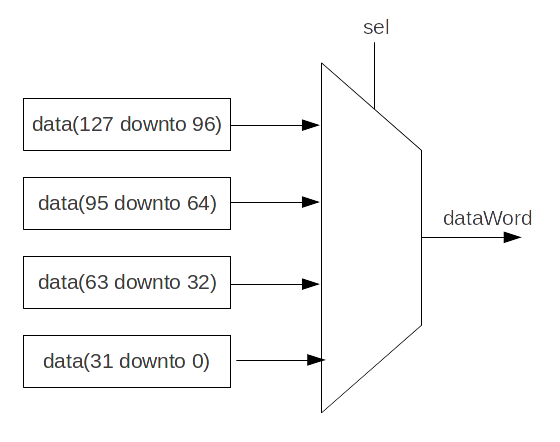When/Switch/Mux
When
As VHDL and Verilog, signals can be conditionally assigned when a special condition is met.
when(cond1){
//execute when cond1 is true
}.elsewhen(cond2){
//execute when (not cond1) and cond2
}.otherwise{
//execute when (not cond1) and (not cond2)
}
Switch
As VHDL and Verilog, signals can be conditionally assigned when a signal has a defined value.
switch(x){
is(value1){
//execute when x === value1
}
is(value2){
//execute when x === value2
}
default{
//execute if none of precedent condition meet
}
}
Local declaration
It’s possible to define new signals into a when/switch statement.
val x,y = UInt(4 bits)
val a,b = UInt(4 bits)
when(cond){
val tmp = a + b
x := tmp
y := tmp + 1
} otherwise {
x := 0
y := 0
}
Note
SpinalHDL check that signals defined into a scope are only assigned inside this one.
Mux
If you just need a Mux with a Bool selection signal, there is two equivalent syntaxes :
Syntax |
Return |
Description |
|---|---|---|
Mux(cond, whenTrue, whenFalse) |
T |
Return |
cond ? whenTrue | whenFalse |
T |
Return |
val cond = Bool
val whenTrue, whenFalse = UInt(8 bits)
val muxOutput = Mux(cond, whenTrue, whenFalse)
val muxOutput2 = cond ? whenTrue | whenFalse
Bitwise selection
A bitwise selection looks like the VHDL when syntax.
Example
val bitwiseSelect = UInt(2 bits)
val bitwiseResult = bitwiseSelect.mux(
0 -> (io.src0 & io.src1),
1 -> (io.src0 | io.src1),
2 -> (io.src0 ^ io.src1),
default -> (io.src0)
)
Also, if all possible values are covered in your mux, you can omit the default value :
val bitwiseSelect = UInt(2 bits)
val bitwiseResult = bitwiseSelect.mux(
0 -> (io.src0 & io.src1),
1 -> (io.src0 | io.src1),
2 -> (io.src0 ^ io.src1),
3 -> (io.src0)
)
muxLists(...) is another bitwise selection which take as input a sequence of tuple. Below an example of dividing a Bits of 128 bits into 32 bits :

val sel = UInt(2 bits)
val data = Bits(128 bits)
val dataWord = sel.muxList(for(index <- 0 until 4) yield (index, data(index*32+32-1 downto index*32)))
// This example can be written shorter.
val dataWord = data.subdivideIn(32 bits)(sel)